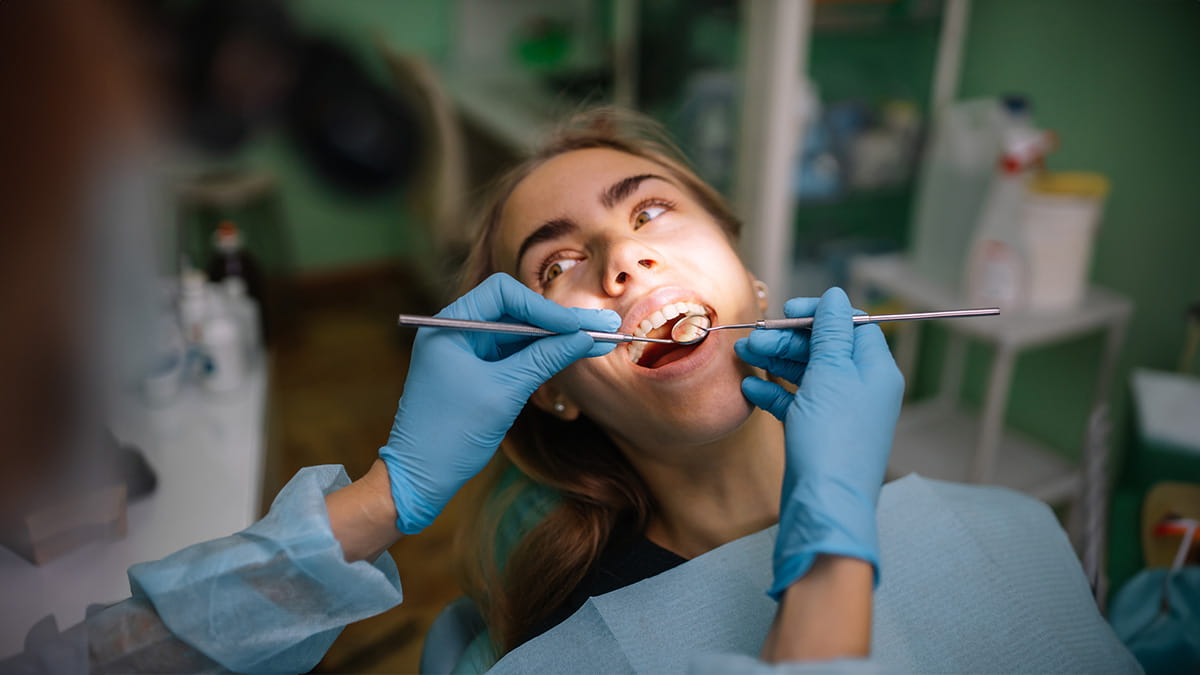Blog article
Oral health quiz

Think you know your molars from your incisors?
What about the difference between gingivitis and periodontitis?
Put your dental knowledge to the test with our oral health quiz. Good luck!
1. Enamel is the hardest substance in the human body, true or false?
a) True
b) False
2. Which of the following is not a function of saliva?
a) Digestion
b) Lubrication
c) Protection against tooth decay
d) Regulation of body temperature
3. Which vitamin is essential for healthy gums and preventing gum disease?
a) Vitamin A
b) Vitamin C
c) Vitamin D
d) Vitamin K
4. Which of the following is not a type of tooth?
a) Incisor
b) Canine
c) Bicuspid
d) Carpals
5. What is the proper term for bad breath?
a) Gingivitis
b) Halitosis
c) Plaque
d) Periodontitis
6. What is the recommended duration for brushing your teeth?
a) 1 minute
b) 2 minutes
c) 5 minutes
d) 30 seconds
7. What is the name of the condition characterised by the reversible inflammation of the gums?
a) Gingivitis
b) Periodontitis
c) Cavity
d) Abscess
8. How frequently is it generally recommended to visit the dentist for check-ups?
a) Every 3 months
b) Every 6 months
c) Once a year
d) Only when experiencing pain
9. Neglecting oral care has been associated with increased risks of heart disease, stroke, and diabetes, true or false?
a) True
b) False
10. What is the name for the hard tissue that covers the root of a tooth?
a) Enamel
b) Dentin
c) Cementum
d) Pulp
11. Due to their temporary nature, baby teeth require less care than adult teeth, true or false?
a) True
b) False
12. What percentage of people are born without wisdom teeth?
a) 1%
b) 5%
c) 35%
d) 50%
13. How many teeth do our baby set contain?
a) 18 teeth
b) 20 teeth
c) 22 teeth
d) 24 teeth
14. How many teeth do our adult set contain?
a) 28 teeth
b) 30 teeth
c) 32 teeth
d) 34 teeth
15. Which animal has the most teeth?
a) Sharks
b) Crocodiles
c) Snails
d) Giant armadillo
Answers:
1. Enamel is the hardest substance in the human body, true or false?
a) True
Enamel, the outer covering of our teeth, is hardest substance in the human body – even harder than bone! With no blood supply, enamel is unable to repair itself or grow back, meaning proper dental care is all the more crucial to maintain its integrity and prevent damage.1
2. Which of the following is not a function of saliva?
d) Regulation of body temperature
Saliva is a powerhouse of the mouth, playing a vital role in maintaining oral health by safeguarding teeth and gums against decay through the removal of food particles and lubrication.2 It also serves as the initial step in the digestive process, commencing as soon as food enters the mouth.3 Despite its many talents, however, saliva is not responsible for regulating our body temperature.
3. Which vitamin is essential for healthy gums and preventing gum disease?
b) Vitamin C
Vitamin C is essential for maintaining the health and strength of the connective tissues in your gums, which support and secure your teeth in place. Insufficient levels of vitamin C can result in weakened gums and may lead to issues such as bleeding gums and gum disease.4
4. Which of the following is not a type of tooth?
d) Carpals
Incisors are the sharp, flat-edged teeth located at the front of the mouth; they are primarily used for cutting and biting into food. Canines, also known as cuspids, are the pointed, fang-like teeth located next to the incisors; their primary function is to tear and pierce food. Bicuspids, also referred to as premolars, are the flat-topped teeth located behind the canines; they have two pointed cusps and are used for grinding and crushing food.5 Carpals, on the other hand, refer to the carpal bones located in the wrist.6
5. What is the proper term for bad breath?
b) Halitosis
Halitosis, commonly known as bad breath, primarily stems from sulphur-producing bacteria residing on our tongue's surface and within the throat. Other causes can include periodontitis (gum infection), chronic dry mouth, acid and bile reflux and chronic sinusitis.7
If you suffer from halitosis, it’s worth making an appointment with your dentist for a check up.
6. What is the recommended duration for brushing your teeth?
b) 2 minutes
Dr Troy McGowan, EGM – Clinical Excellence, HBF Dental, recommends brushing teeth for at least two minutes. “Brush your teeth at least twice a day, ideally 30 minutes after meals and before bedtime, for a minimum of two minutes each time.”
7. What is the name of the condition characterised by the reversible inflammation of the gums?
a) Gingivitis
Gingivitis is gum inflammation caused by plaque build-up. If untreated, it can progress to periodontitis, where the inflammation causes irreversible damage to the tissues and bone supporting the teeth, possibly leading to tooth loss. Regular dental care is crucial to prevent and treat both conditions.8
8. How frequently is it generally recommended to visit the dentist for check-ups?
b) Every 6 months
According to Dr Bee Hong Tan, a dentist from HBF Dental, it’s recommended to visit the dentist every six months. “Regular check-ups allow dentists to closely monitor your dental health and pick up any concerns early. It’s also a good opportunity to remove any plaque and calculus that has not been removed with regular tooth brushing.”
Like any other health professional, dentists are there to help. Waiting until pain arises may lead to more extensive and costly treatments.
9. Neglecting oral care has been associated with increased risks of heart disease, stroke, and diabetes, true or false?
a) True
In addition to tooth decay and gum disease, neglecting oral care has been linked to various chronic health conditions, including heart disease, stroke, and diabetes. Critical health concerns, such as oral cancer, might also go unnoticed without regular trips to the dentist.9
10. What is the name for the hard tissue that covers the root of a tooth?
c) Cementum
Cementum is a calcified tissue that covers the roots of our teeth, providing a protective layer and anchoring the teeth securely within the jawbone.1
11. Due to their temporary nature, baby teeth require little to no care, true or false?
a) False
Baby teeth play a crucial role in speech development and maintaining space for permanent teeth.10 In addition, baby teeth suffering from cavities or decay may damage the adult teeth underneath.11
12. What percentage of people are born without wisdom teeth?
c) 35%
Wisdom teeth, or third molars, are the last teeth to emerge. They can cause problems like overcrowding and infection, leading to removal in many cases. A lucky 35% of the population are born without them, avoiding these issues altogether.13
13. How many teeth do our baby set contain?
b) 20 teeth
Our baby teeth, totalling 20 in number, are crucial for children's development. They help with chewing, speaking, and maintaining space for permanent teeth. Despite being temporary, they require proper care to prevent issues like cavities and infections. Regular dental check-ups and good oral hygiene habits are essential from an early age to ensure their health.11
14. How many teeth do our adult set contain?
c) 32 teeth
Our adult or permanent set of teeth, totalling 32 in number, is crucial for various functions such as chewing, speaking, and maintaining facial structure. These adult teeth are meant to last a lifetime, so proper care is essential to prevent issues like decay and gum disease.1
15. Which animal has the most teeth?
c) Snails
While sharks, crocodiles, and giant armadillos have a notable number of teeth (50-300, 60-110, and 80-100, respectively), it's snails that take the crown for the highest tooth count. Snails can have an astonishing 12,000 teeth, with some species possessing 20,000 teeth. That’s a lot of flossing!
Sources
1Better Health Channel - Teeth
2NSW Health - Healthy habits for a healthy mouth
3Better Health Channel - Mouth
4Frontiers in Nutrition - Beneficial Effects of Vitamin C in Maintaining Optimal Oral Health
5Teeth.org.au - Tooth anatomy
6ScienceDirect - Carpal Bone
7Better Health Channel - Halitosis or bad breath
8Healthdirect - Gingivitis
9Healthdirect - Dental check-up
10National Library of Medicine - Evaluation of knowledge and attitude of parents about the importance of maintaining primary dentition - A cross-sectional study
11Healthdirect - Dental care for children
12Better Health Channel - Wisdom teeth
13How Stuff Works - Are people without wisdom teeth more highly evolved?
14Discovery UK - How Many Teeth Do Sharks Have and Other Sharks’ Teeth Facts
15Crocodile Specialist Group - The Crocodilian Body
16AZ Animals - Giant Armadillo
17Facts About Snails - Do snails have teeth?
This article contains general information only and does not take into account the health, personal situation or needs of any person. In conjunction with your GP or treating health care professional, please consider whether the information is suitable for you and your personal circumstances.



